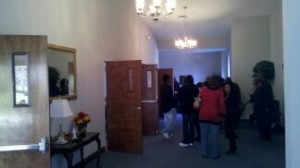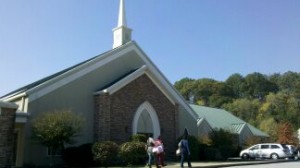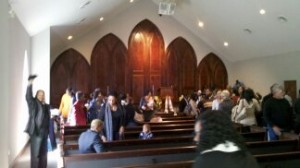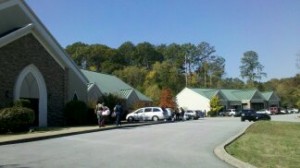Church Experience #41 – October 30, 2011
Living Stones Ministry – Chattanooga, TN
Don’t Read This
Race is an interesting topic in society today. It can be controversial, a cause of hate and anger, a story of love and acceptance, or a complete non-issue. You can look at different races and point out scores of differences and then just as easily come up with an equal number of similarities. Within the realm of Christianity we are called to a higher standard than society in general when it comes to our view on race. Our calling is one of unconditional love, just as our savior, Jesus Christ, provided us with the ultimate example. My point of view is that race does not exist, but culture does. No matter what pigmentation a person’s skin contains, they will more than likely be a reflection of the culture they have been exposed to for the majority of their formative years. Of course there are innumerable factors at play here, and probably just as many exceptions as there are inclusions, but for the basis of this article I want to be very clear about how and why I formulate my thoughts and hopefully avoid any offense. For me, race is not a sensitive topic and I fully believe God has given me the ability to see people as people regardless of their race. I do see differences in cultures and I will be commenting in this article about my experiences and observations of these differences. My comments are not meant to be stereotypical or come from any type of bias or discrimination. They are simply my experiences and observations. Sorry for the long “disclaimer”, but this week’s church visit brought out some pretty powerful feelings and emotions in me that a lot of other people probably will not agree with. My wife did not agree with some of my sentiments and became frustrated with me when we were discussing them. Hopefully I do not frustrate even more people, but instead, my hope is that anyone who reads this will consider why I felt these things from my point of view without interjecting your own point of view into my situation. In fact, if you would like to get some real honest insight into how you really feel, I would recommend putting yourself in the same situation and make your own observations from your own experiences. In the end, that is really the purpose of my blog anyway. It is not for Chattanoogans to live vicariously through my experiences…this blog is an encouragement for you to get out there and have some experiences of your own. I am just pointing out the obvious…that interesting things are happening all around us in church every week, you just have to be present and open to experience them! OK, sorry about the rant (not really…but I kind of am…but no, not really). So if you are still reading, here is how my church visit went this week…
Smooth Vocals

Back at the beginning of 2011 I visited Metro Tabernacle, where I was introduced to a musical group called Sounds of Destiny. One of the members of this group told me about attending Living Stones Ministry, a local church located on Benton Drive, just off of Highway 153 and Bonnie Oaks Drive in Chattanooga. I tried to look them up online, but only found a Facebook page, and the extent of their description on there was “Purpose. People. Now.” Hmmm…doesn’t really tell me too much about what to expect. The only other thing I could tell about the church was that from the looks of the pictures, it was a mostly black congregation. I can only assume that black nondenominational churches are as much of a toss-up about what goes on there as the predominantly white nondenominational churches are, so I was looking forward to showing up at Living Stones Ministry to find out. As we walked toward the building we could hear music already emanating from inside and the entrance doors were pushed open by a gentleman who welcomed us in warmly. We were greeted several more times on the way through the lobby and as we turned into the sanctuary my eyes were drawn immediately to the stage where they locked on the worship leader, a young man with thick square-framed glasses and a suit. He constantly remained in motion, crossing from one side of the stage and back to the other while both singing and speaking a flow of praises and prayers. On the right side of the stage was a trio of musicians on the keyboard, bass guitar, and drums, offering amazingly funky and soulful accompaniment that looked effortless for them. The song leader’s voice was silky smooth and reminded me of Q-Tip from A Tribe Called Quest. While the intro worship music was going on we found our way to a pew near the front and sat down and were greeted by a few more friendly faces. After a few minutes everyone stood for a Scripture reading from Psalm 119:81-88 and then an invitation to take a few minutes to greet people around the room. We were received very graciously and were given quite a few hugs, handshakes, and words of encouragement…it was definitely a more heartfelt “visitor welcome” than I am used to receiving.
Cultural Freedom

After the greeting time was over the stage filled up with an additional eight or nine praise singers (including a boy who looked maybe twelve or thirteen) and the real worship began. The music was up-tempo, gospel-based, call and response style singing with the same funky instrumental accompaniment as earlier. As we clapped, sang, and moved to the music, I could feel my spirit lifted up and an immense joy well up inside me. I could not contain my smile as I worshiped the Lord alongside the people of Living Stones Ministry, and as the music flowed from song to song without ever pausing, I realized that this was exactly what I needed. Not that worship has anything to do with what I need. It is and should be all about God, but when I feel really “connected” in worship and begin to feel the joy and peace of the Lord, I know it is good for both of us. I am just so thankful that worshiping my God makes my heart glad! I hope He gets as much out of it as I do. During this time I began thinking about the differences in worship styles between black churches and white churches (and this is where my opening disclaimer paragraph comes into play). I personally feel like black churches have a sense of freedom in their worship that few white churches ever attain. The people (speaking culturally) have no concern about what others might think about them if they raise their hands, dance around, stomp on the ground, clinch their fists, jump up and down, twist and shout, or whatever else they feel like doing. They just have an unabashed freedom of worship where they can do what they feel like doing. I rarely see this in white churches and it bothers me. This is also where my wife and I disagree. She feels like she gets to that same place in her worship without the outward expression, but she will agree that at white churches people are more concerned about their actions and appearance and feel less “free” to worship expressively. Isn’t Christ all about freedom? If we are offering praises to our Savior, why would we care what others think about the way we do it? He made us who we are. No matter how bad our rhythm is, how uncoordinated our dance moves are, and how out of tune our singing might be, you can’t tell me they do not mean just as much to God than if they were completely graceful and pitch-perfect. Heck, our worship might even be more pleasing to Him when it is bad because He knows how much harder it is for us to overcome our fear of ridicule and do it anyway. I just really enjoy the worship at black churches and wish that same freedom could be experienced at all churches of all cultures.
Closing Thoughts


After the worship ended, the pastor stepped up onto the stage and gave a message about leading disciplined lives. Even though there was a podium at the front of the stage, the pastor rarely stood behind it and instead walked from to side to side on either side of the podium as he delivered the sermon. He spoke with a pleading voice that fluctuated from soft to shouting and was full of emotion and encouragement at all times. He pointed out that knowledge was only one tool that is gained from education, and that you usually only retain information for the moment when it is needed such as for a test. The real benefit of an education is the maturity that is gained from the discipline required to complete it. He taught from John 11 and offered the illustration that there is a “cave of a dead Lazarus” in each of us, which requires us to do as 1 Corinthians 15:31 states and die daily so that we may be made alive. When the service ended, Laura and I were quickly engaged in conversation by several people and were invited back to Living Stones Ministry with enthusiasm. We said our goodbye’s and departed, and I brought up the cultural differences in worship as a topic of discussion on our way home. You may not agree with my views and may not have any issues with freely engaging in expressive worship, but I know there are people out there who do. It is my hope that as Christians we are all able to nurture a culture in our churches where no person is more concerned with how they may be perceived by others than with whether they are worshiping God in spirit and in truth. And on that point I will leave you with a pretty funny take on this topic from Tim Hawkins.

If you enjoyed this article, please click the Google +1 button at the top or bottom of the page to help others find it also.
Please share the ChurchSurfer blog with anyone you know who may be interested, and I also invite you to connect on Facebook and Twitter. Please post comments below, and you can email me directly at josh@churchsurfer.com.
Grace and peace in Christ,
Josh Davis

Forgive me for butting my nose into your argument, but I think your definition of freedom is a bit off. As you pointed out, we are all a product of our environment to some degree or another. For the person who has grown up in the black church worship scene, it is not necessarily an act of “freedom” to express oneself physically in worship. It is just what people do. If anything, one could argue it is as much an act of conformity and concern about what “others would think” as the conservative Christian’s lack of gestures or movement. What if that black worshiper actually doesn’t feel free by the movement, but forces him or herself to move because everyone else is? Isn’t that actually restrictive? Freedom is when you let the Holy Spirit move you in worship – however that may manifest itself. For me, it sometimes means sitting down and not singing because I get so wrapped up in singing “my best” that it can distance me from true worship. Just my two cents.
Sara, thanks for the comments and you are exactly right. I also thought about the fact that expressive worship may be just as much an act of conformity as non-expressive worship, depending on the environment. You are also correct that the only true freedom of worship is when we let go and allow the Holy Spirit to move in us, and that may look very different from person to person. Great points! I think my basis for the article (and I probably do a terrible job of using the written word to convey my thoughts) was that people who may get animated and passionate over a sporting event, a competition, or even a debate with friends will suddenly lose that ability in church for fear of what others may think about them. I personally prefer a worship environment that does not “feel” prohibitive if you want to jump, dance, lift hands, and get excited, but I also prefer an environment that doesn’t judge if you don’t do those things. Then you also have to consider people who may go overboard with worship and get unruly or inappropriate, but that’s a whole other blog topic :).